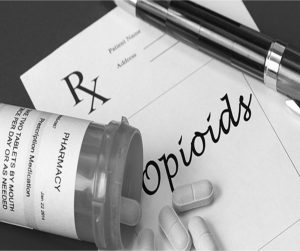[vc_row][vc_column][vc_cta h2="Help Is Only A Phone Call Away" txt_align="center" shape="round" style="flat" color="vista-blue" el_width="sm" use_custom_fonts_h2="true" use_custom_fonts_h4="true"]Call Now 855-227-9535[/vc_cta] Over-the-counter pain relievers are usually enough to help provide relief for mild headaches and muscle pain. But some people suffer from more severe aches and pains, which is why they need stronger solutions. In these cases, their doctor might prescribe an opioid medication. Opiates and opioids are both classified as “narcotics”. And we know that narcotics have a bad reputation for causing addiction, for being abused by drug addicts, and for their habit-forming properties. But part of this stigma is perhaps attributable to the fact that in law enforcement, people use the word “narcotic” to refer to any mind-altering drug or any illegal substance. But in the medical industry, opiates and opioids are the only substances that are classified as narcotics. And they are helpful medications too: they are powerful painkillers that help patients suffering from moderate to severe pain. The dangers and risks only come into play when someone misuses their prescription. Today we’ll have a closer look at the effects of opioids, specifically, how it interacts with the brain.
Opioids: An Overview
 Opioids and opiates are both derived from the opium poppy plant. Opiates are naturally derived from that plant, while opioids are either synthetic or semi-synthetic derivatives. Both types are prescribed as painkillers. They have habit-forming properties because of the euphoric sensation they produce. There’s a higher risk of addiction if the person takes opioids recreationally to get high. But these drugs are not inherently bad. Some common opioids that you may have already encountered are the following: codeine, Fentanyl, hydrocodone, hydrocodone/acetaminophen, methadone, morphine, oxycodone, meperidine, hydromorphone. These are all generic names for commonly prescribed opioids. Most of them can cause serious side effects if you don’t use them correctly.
Opioids and opiates are both derived from the opium poppy plant. Opiates are naturally derived from that plant, while opioids are either synthetic or semi-synthetic derivatives. Both types are prescribed as painkillers. They have habit-forming properties because of the euphoric sensation they produce. There’s a higher risk of addiction if the person takes opioids recreationally to get high. But these drugs are not inherently bad. Some common opioids that you may have already encountered are the following: codeine, Fentanyl, hydrocodone, hydrocodone/acetaminophen, methadone, morphine, oxycodone, meperidine, hydromorphone. These are all generic names for commonly prescribed opioids. Most of them can cause serious side effects if you don’t use them correctly.
How Do Opioids Affect the Brain?
Opioids block incoming pain signals by attaching to the so-called opioid receptors in the brain, spinal cord, and other regions of the brain. This provides relief and comfort. However, the intense feeling of joy and wellbeing may trick the person into thinking they want to keep taking the drug. This is why many people get addicted. Opioids can relax the user and may push them to self-medicate. So to be safe, make sure you take the exact dosage given to you by your doctor. Do not take opioids more often than you’re supposed to. It may cause adverse effects. Addiction, tolerance, and drug dependence are all possible outcomes of taking large doses of opioids for an extended period of time. Tolerance is when the body adapts to the drug’s presence. Eventually, the patient starts feeling like they need more and more of the drug, just to feel the same effects. If a person becomes physically dependent on an opioid, they won’t be able to quit the drug abruptly. Doing so will cause them to go into withdrawal. It will also create intense cravings, which will inevitably lead to relapse. Quitting opioids after developing dependence can lead to withdrawal symptoms including diarrhea, nausea, vomiting, muscle pain, anxiety, irritability, etc. The severity of withdrawal symptoms will depend on the patient’s drug habits, the drug choice, and other factors such as physical health. Finally, addiction is the compulsive need to take a drug. It affects the nervous system just as much as it affects behavior. Because of opioid misuse, the brain gets hooked. An addicted individual will keep abusing their prescription drugs, even when they’re already suffering from the physical and emotional side effects. [maxbutton id="3" ] To combat these overwhelming effects, addiction treatment is necessary. Drug detox will involve gradually lowering the person’s intake while medical professionals manage the withdrawal symptoms. This is done slowly over time. Behavioral therapy also goes a long way toward addressing the root of addictive behavior, be it family-related, financially motivated, stress-induced, or anything else. Substance abuse affects mental health by causing various brain changes in those who are addicted to drugs. With proper medical attention and behavioral therapy, an addicted person can get back to living a sober life. Alcohol and drug addiction can be beaten. Fight the effects of drug abuse today. Look for a treatment center near you.
The above article How Opioids Affect the Brain: Why You Should Take Your Prescription Seriously was originally published on https://www.rehabnear.me/
from
https://www.rehabnear.me/opioids-affect-the-brain/

No comments:
Post a Comment